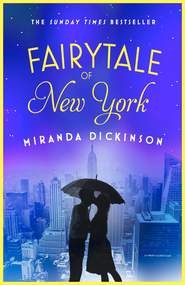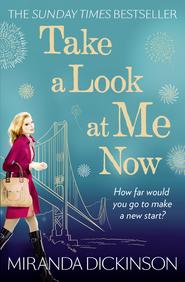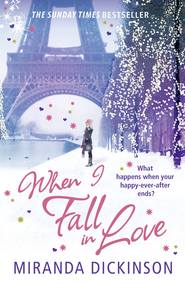По всем вопросам обращайтесь на: info@litportal.ru
(©) 2003-2025.
✖
Miranda Dickinson 2 Book Bundle
Автор
Год написания книги
2018
Настройки чтения
Размер шрифта
Высота строк
Поля
Ed’s eyes had scared me that day. There was a whole other story going on in those eyes. And I couldn’t read it completely. Their piercing blue was usually warm and mischievous, impatiently awaiting any chance to sparkle. But that afternoon his eyes had been cool, questioning—guarded, even. I hadn’t seen that before and it unnerved me. He had said things were OK. His smile and friendly kiss said things were OK. So I should have believed him—I did believe him—yet that stubborn question mark remained. He had said he was OK, but his eyes maintained their silence.
On the walk home, I noticed something odd in my brother’s eyes too. Though James chatted happily about his day and joked about the people he’d met, I couldn’t shake the feeling that there was something he wasn’t telling me. It had been steadily building since he’d arrived and he had done nothing to dispel my suspicions.
It was still on my mind two hours later, when James and I ventured out again to Blue: One, the current restaurant of choice in New York. I was stunned that James could even get a drink in this place, let alone reserve a table. Celia could normally get a reservation anywhere, but even she had to wait a month for one here. The restaurant sat beneath one of the top hotels just off Broadway and its clientele included theatre stars, television celebrities, directors and lawyers. It was said that Blue: One had a waiting list four pages long for bar and waiting staff, due mainly to the fact that jobbing actors regarded it as the place to be noticed by the People Who Mattered.
James and I were shown to a table towards the back of the restaurant. Blue was undisputedly the theme here. The walls were painted dark navy and illuminated by aquamarine uplights, whilst tiny blue lights dotted like cobalt stars around the main halogen spots in the turquoise ceiling, adding to the intimate ambience of the venue. Efficient waiters scurried about in white shirts and navy-blue trousers, carrying blue linen cloths over one arm. A large aquarium was set into two of its walls, filled with a plethora of tiny, multihued fish, which appeared to be moving with the same momentum as the staff.
The waiter brought us each a mojito and we ordered our meals. James took a sip of his drink and looked at me. ‘Right, Rosie, what’s up?’
‘Sorry?’
‘Don’t give me that. You’ve been quiet all evening.’
I smiled at him. ‘I’m fine, James, really. I had a busy day. That’s all.’
‘Phew! I thought you had a major problem and I’d have to work at you all night to get at it. What a relief!’ James has never been the World’s Most Tenacious Bloke. Which is one thing I like immensely about my brother: I know he’s too lazy to pry too far. Satisfied with my answer, he continued, ‘So, I had fun today…’
‘You did?’
‘Uh-huh. I did some cheesy sightseeing first thing—you know, Empire State, Statue of Liberty, Macy’s—and then I caught up with an old friend from Oxford.’
‘Who?’
‘Do you remember Hugh Jefferson-Jones?’
I did. My friends and I called him Huge Jefferson-Jones, on account of his considerable height, build and the devastating impression he left on our young minds the moment we saw him. We weren’t alone in calling him this: so too (allegedly) did a considerable contingent of his fellow female students and at least two of his female lecturers, although for an entirely different reason…Huge used to come to our house and stay for weekends so he could go rock climbing and sailing with James. I was about sixteen at the time and all my friends fancied him like mad. Huge was the ultimate charmer, one of life’s naturally gorgeous people. And he knew it—even at nineteen years old. Standing tall at six foot four, he dwarfed my brother (much to James’s annoyance) and had a body like I’d only ever seen in action movies. He was a star of the rowing team, a leading light in the drama society, a general all-round hero. Hailing from a millionaire’s family, he spoke the Queen’s English with a deep, velvet-smooth voice, which made my tummy flutter. I had a massive crush on him but, seeing as my vow to never, ever get married was still intact at that point, I resolved to be happy just looking.
‘How is he?’ I asked.
James smiled. ‘Still Huge. Still popular with the ladies. And still a good old toff, to boot. He’s working at the British Consulate-General and has to go to the UN regularly.’
I grinned at the thought of Huge charming the ladies of the world as part of his job. ‘I bet he’s a whiz at diplomacy. He always had a way with words.’
‘Hmm, amongst other things,’ laughed James, ice cubes clinking as he took another sip of his drink. ‘He asked after you, by the way.’
‘Did he? What did he say?’
‘He said, “How’s that adorable chubby little sister of yours?”’ James laughed, enjoying my mortified expression. ‘He couldn’t believe you were living here now. So I told him to get the New York Times on Saturday and see how much you’ve changed. I gave him your card, said you weren’t a patch on Devereau Design, but that he should support his fellow ex-pat Brits.’
‘Thanks, James.’
‘You’re welcome.’ Sarcasm is always lost on my big brother. ‘Yeah, so we had some lunch and he showed me round the consulate building. He’s just split from his second wife you know.’
‘Second? I didn’t know he was married at all.’
‘Of course he was—where have you been, Rosie? You must know that, surely? Oh, well, he met his first wife just after uni, but they lasted only eighteen months. Then he moved to the consulate after his divorce and hooked up with an intern at City Hall. They lasted six years. Sad really. She left him a few months ago for one of his colleagues.’
‘Who’d get married, hey?’ I commented. And it was weird, but I’m certain I saw James flinch. I said nothing, but watched with interest as he changed the subject quicker than Celia on a good day.
‘Ah, splendid. Here’s our food at last. Don’t know about you, but I’m starving…’
When we got back to the apartment there was a message from Celia so I called her while James made a pot of tea.
‘Rosie, darling, I’ve seen the proofs for your piece on Saturday. It’s wonderful—you’re gonna be so thrilled, honey! I’m due to meet Henrik at The Aviary on 66th tomorrow for lunch, so can I come see you first? I want to get all the details on your meeting with Brent. And Nate Amie.’ I could hear her smile right down the phone.
‘How on earth did you find out about that?’ I asked incredulously.
Celia giggled. ‘I’m a journalist, honey, it’s what I do. And I’m afraid I can’t reveal my sources. That would be highly unethical…’ She paused, waiting for my reaction.
I played hard to get. ‘Absolutely. Quite right. You stick to your principles, mate.’
Bingo! Celia exploded with pent-up frustration. ‘Rosie Duncan, you are infuriating! OK, OK, I’ll tell you who it was…but only because you’re my closest friend and I love you dearly. Nate called me this evening and told me he’d been to see you. And he mentioned the word “remarkable” in the same sentence as your name!’
I made a mental guess at what that could be. ‘Rosie Duncan’s store was remarkable’—that would be OK. ‘The coffee from Rosie Duncan’s percolator is remarkable’—that would be good too. But what if it was something like, ‘It’s remarkable how weird Rosie Duncan is’? Hmm.
‘Well, I can tell you all about his visit when you come to the shop tomorrow,’ I said. ‘I’m sure you’ve got lots to tell me too.’
‘Absolutely,’ she affirmed, ‘especially considering the fact I also saw Mimi Sutton tonight.’
‘Ah, the plot thickens.’
James arrived with two mugs of tea. ‘Is that your wacky friend? Say hi from me.’
I smiled. ‘James says hi.’
Celia’s tone changed. ‘James? Your brother James? He’s there?’
‘Yes times three. He surprised me yesterday.’
‘But I thought he was in Washington…’ Celia sounded distracted, thoughtful.
‘Yes, he was. He’s just staying with me till Saturday morning, then he’s going back. Are you OK, Celia?’
There was a brief pause. I could hear her breathing. ‘I’m fine, Rosie. Yes, just fine…Well, gotta go. The kids go back tomorrow, thank heaven, so we’re getting pizza tonight and they’ve rented some gosh-awful movie. I may not survive the night…I’ll see you tomorrow morning, honey. Bye.’
James saw my puzzled expression as I put the receiver down. ‘And how is the inimitable Ms Reighton?’
‘She’s fine, I think.’ Truth be told, I wasn’t sure. ‘She seemed a little surprised you were here.’
James flopped down beside me. ‘There isn’t a great deal of love lost between me and Celia, Rosie, you know that. The last time I saw her we had a blazing row—don’t you remember?’
I did. I’d just as soon as forget it, though. It was one of those Really Bad Ideas you have in all good faith, only to repent at leisure. Wouldn’t it be a great idea to invite Celia to have dinner with my brother? I’d thought, in my naive innocence. It was about a year after I’d settled in the city and I’d finally completed refurbishing my apartment—including my prized 1920s dining-room table that I’d found at the Boston Flea, a wonderful flea market that Ed and I visit regularly, with the most eclectic collection of vintage furniture, lamps and clothing. (I go for the vintage stuff, Ed goes for the waffles.) So, thought I, who better to invite to my housewarming than my brother, my best friend and her partner?
Now, a self-confessed optimist I may be, but I defy even Pollyanna to find something in that evening’s events to Be Glad about. As I recall, Jerry kicked off the argument by remarking that everybody agreed that Oxford and Cambridge were far inferior to Harvard or Yale—to which James responded with an attack on American ‘all-mouth-no-substance’ intellect. Celia attempted to change the subject by talking about her latest gathering of New York writers but James was on a roll and proceeded to reduce every author after Steinbeck as ‘mere pretenders and band-wagon jumpers’. By the time I served dessert, the debate had run its course and my guests had resorted to defiant silence. And coffee was accompanied by averted eyes, served with generous helpings of underlying rage. I still harboured hopes that, one day, Celia and James would get on. But it appeared that, for now, those hopes must remain safely stashed in the file marked Highly Unlikely.
James was dismissive as ever about Celia’s reaction, but I was aware of a jumpiness about him. It was carelessly hidden—like the dodgy magazines he used to stash under his bed as a teenager—with just enough showing to reveal their existence, but not enough to tell you exactly what they were.
Once I knew his guard had dropped, I broached the subject, handing him a pack of Oreos to soften the impact of my question. ‘So—what’s the story, Jim?’











